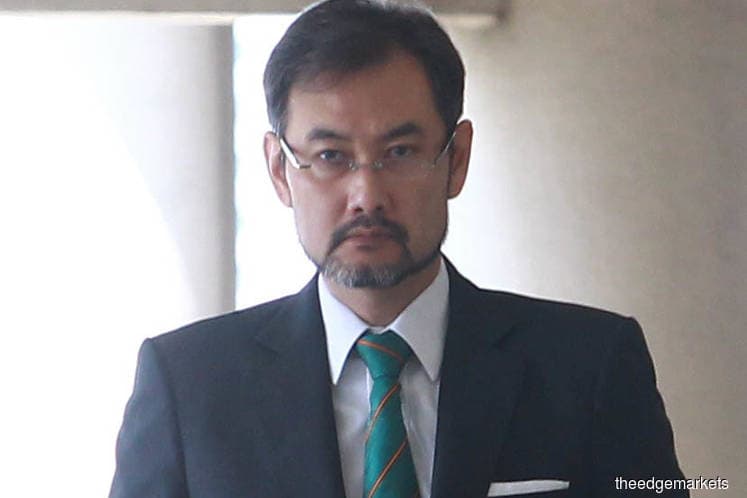
KUALA LUMPUR (Nov 6): The defence in Datuk Seri Najib Razak’s 1Malaysia Development Bhd-Tanore (1MDB-Tanore) trial has argued that there may have been a conspiracy by PetroSaudi International Ltd (PSI) executives Tarek Obaid and Patrick Mahony to ensure that the former Prime Minister would expedite the release of US$1 billion to their company.
This was brought up in the 1MDB-Tanore trial by lead defence counsel Tan Sri Muhammad Shafee Abdullah, referring to an article by The Edge weekly issue dated June 18-24, 2018, which carried an email exchange between Tarek and Mahony dated Aug 7, 2010.
The lawyer read out the contents of the email in court today and tried to verify them with prosecution witness Datuk Shahrol Azral Ibrahim Halmi.
However, the former chief executive officer of 1Malaysia Development Bhd (1MDB) said he was not comfortable commenting on the email as he was not involved in what the PSI executives were doing.
Judge Collin Lawrence Sequerah also stepped in and questioned the relevance of verifying the email content with Shahrol.
“The witness is not privy to all these," he said.
Nonetheless, Shafee requested to ask about the final question on the fourth paragraph of the email, which covers Obaid and Mahony’s plan to convince Najib to accelerate the loan disbursement from 1MDB to PSI in 2010.
“Do you agree that based on point four, there is a conspiracy to deceive the Prime Minister,” he asked Shahrol.
"Based on point four, and only on point four, it does look like there was a conspiracy to deceive the Prime Minister," Shahrol replied.
Point four of the email states:
“On the $1b funding, the thing to tell the PM is that we have some very good investment prospects pending and that we really need the funds quickly. The constant broken promises and delays have hurt our business hugely and cost us (I think saying delays have cost us helps us because we can then blame them for the losses later). I wouldn’t discuss the $500m write-off with the PM or any losses at this point (this is Jho’s thoughts only for now but it makes sense) because I think the PM thinks we are making good investments. So I think we promote the JV and all the great things we can do with it but make it clear we need the funds soon and that delays are costing us — therefore we would urge the PM to do everything in his power to make sure we have the full $1b as soon as possible.”
Prior to this, Shafee asked Shahrol whether he is able to tell the identity of “PM” mentioned in the email, to which the witness said "most likely Datuk Seri Najib.”
The email was written after the failed joint venture (JV) between 1MDB and PSI, to which US$700 million of cash capital from the Malaysian funds was diverted to Good Star Ltd, a unit linked to fugitive businessman Low Taek Jho (Jho Low), and Obaid and Mahony were proposing for 1MDB to inject more money for an investment in French-based GDF Suez.
1MDB subsequently sent US$830 million to PSI as an extension to the existing US$1.2 billion Islamic loan paper facility (Murabaha Note), instead of direct investment into GDF Suez for a 4.23% stake, at 20% discount of market price.
Earlier today, documents were also brought up showing that fugitive financier Low Taek Jho, aka Jho Low, and Obaid had provided different reasons to their respective banks for transfers of a total 91 million Swiss francs million from PSI to Good Star in 2010 after the termination of the JV with PSI.
Tarek had told JP Morgan that the transfer was to participate in an investment into Dar Al Arkan with “wealthy Saudi families”.
However, Jho Low had told RBS Coutts, where Good Star has an account, that the incoming funds from Obaid were for “repayment of a loan/investment based on an investment management agreement (private equity)”.
Shahrol said he had not seen nor was shown these documents before.
Nonetheless, Shafee asked whether the witness saw any commonality between the two reasons provided by Jho Low and Obaid for the same transaction, to which Shahrol said he did not see any commonality.
After being shown Tarek’s bank statement in 2010, Shahrol had also revealed that Obaid had once paid “11,400 dollars” for Starbucks coffee, although he did not mention the currency.
“That is very high (for coffee),” the witness joked.
Shafee agreed, and commented that the price Obaid paid did not commensurate with the product quality the company offered.